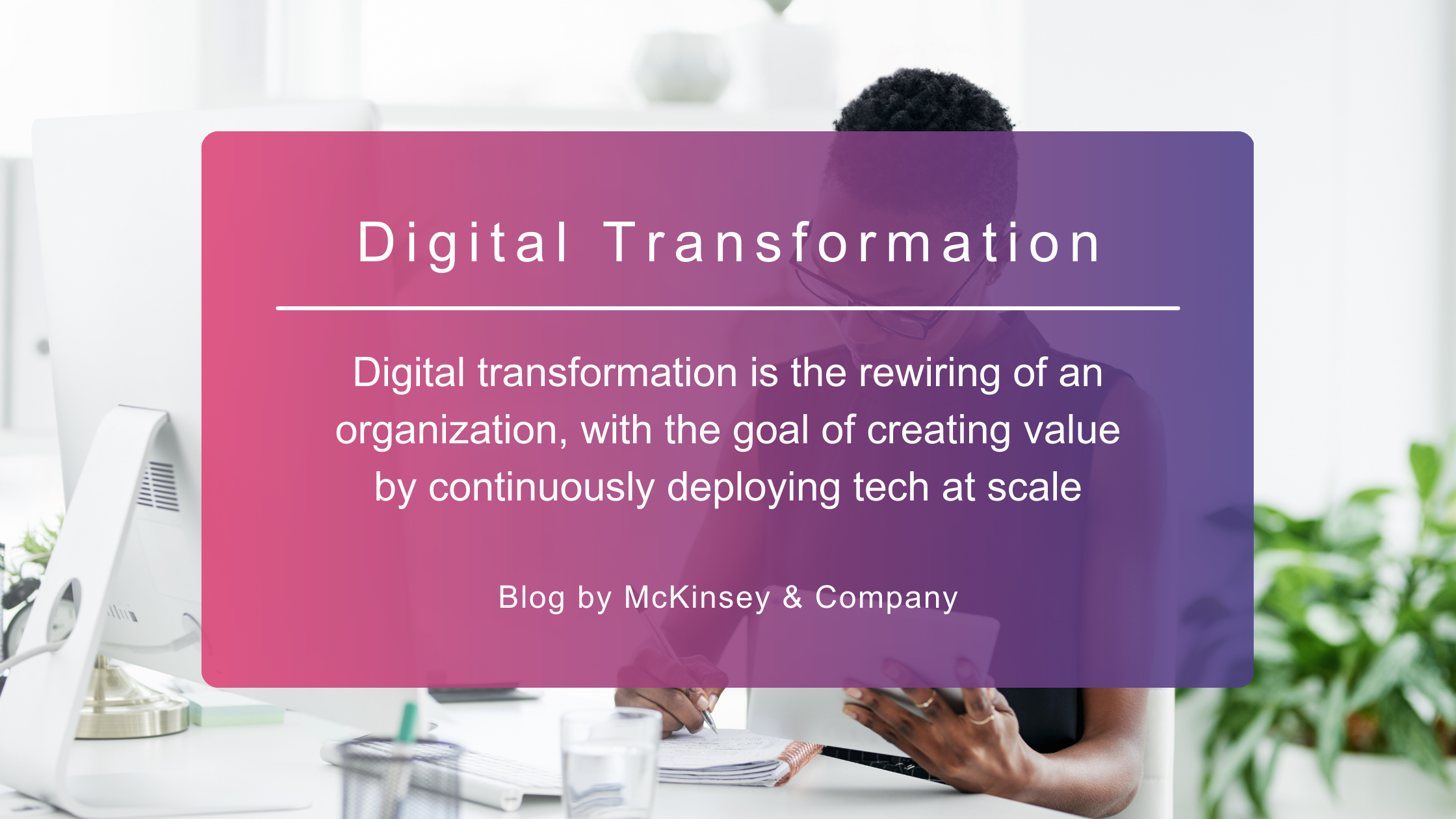Embracing DEI in Digital Transformation: Perspectives from a Female Tech Leader


Tech Talent Charter works with companies of all sizes, sectors, and origins. Nancy Maher is the Founder of Kinkajou Limited, a boutique UK-based global consultancy supporting individuals and businesses in tech drive positive change. With three decades of experience in tech, leadership roles in large organisations across Europe and North America, and an accredited EMCC coach, she knows first-hand what it is like to head up global product teams and change management programmes and why keeping sight of Diversity, Equity, and Inclusion (DEI) goals is vital.
"I have been in the digital products and services industry for thirty years, starting as a software engineer in a two-person home-office and eventually leading global product teams and change initiatives across multiple continents. Being the only female technology leader in the room for most of my career, I experienced both sides, from discrimination and sexist comments to belonging in inclusive cultures. I have been lucky to have some incredible leaders, teammates, and direct reports who have been allies.
During this time, I've led several change management programmes from next-generation product development initiatives to digital transformations that reshaped tools, practices, and processes for 3,000+ people across 20+ global locations. What I learned was that putting people first was vital. For example, steering committees with diverse representation can help to establish psychological safety, ensuring that diverse teams across impacted locations can raise concerns without fear of retribution."
We asked Nancy about how to keep inclusion front and centre during change management. Drawing on her experience, she shared actionable strategies for linking DEI objectives to business goals and how to ultimately develop these during digital transformation.
The technology revolution is forcing change on everyone
The technology revolution – often called the Fourth Industrial Revolution or Industry 4.0 – is disrupting all sectors. Nashsquared reports that 88% of leaders feel significant change is happening faster than ever. According to Kristalina Georgieva, the head of the International Monetary Fund, Artificial intelligence (AI) will affect 40% of jobs worldwide, and it is "crucial" that countries mitigate the impact on vulnerable employees. Moreover, the IMF's concern is the risk posed by AI of furthering inequalities. That's why its becoming a vital for all managers to develop skills around change management. And a key part of change management is understanding the opportunities and risks it presents to your people strategy.
What is 'Organisational Change Management'?
Organisational Change Management (OCM) involves guiding major changes through preparation, implementation, and post-implementation strategies. It covers all types of change programmes: strategic (business models/goals/direction), digital transformation (technology/process/skills), structural (mergers and acquisitions, and cultural (values/behaviours). There is no one universally applicable OCM approach. Some well-known ones are Kotter's 8 Steps to Accelerating Change and Lewin's Change Management Model and its also fine to use a blend of models. Whatever approach you use, a people-first mindset, agility, and adaptation to your context are critical. Crucially all OCM models are only helpful if you bring your people along with you as you use them.
Understanding Digital Transformation in 2024
Digital Transformation represents a type of organisational change programme; it is complex, risky, and a continuous journey. 88% of business leaders state that only up to half of their digital transformation projects met their goals, according to an Endava-sponsored brief by IDC. Artificial Intelligence (AI) is a core element of any digital transformation today. AI's explosive growth is making powerful capabilities accessible to individuals and organisations and reshaping how we live and work. According to Forbes, the five key Digital Transformation trends in 2024 are:
- Embracing AI technology
- Multi-layered cybersecurity
- Personalised content
- Integrating a Hybrid working model
- More robust automation
Why Diversity, Equity and Inclusion is essential during Digital Transformation
In my experience, a people-first approach is the secret sauce of digital transformation change programmes. In fact, McKinsey found that 70% of change programmes fail due to a lack of employee buy-in. Diversity, Equity and Inclusion (DEI) are values shared by organisations that strive to support people from diverse backgrounds, including those of different races, ethnicities, religions, socio-economic status, neurodiversities, abilities, genders, and sexual orientations. DEI is about valuing people. Despite promises made in 2020, tech giants Google and Meta have pulled back on DEI initiatives. While Elon Musk's posts on X (formerly Twitter) that "DEI must D.I.E.," I believe the opposite is true. DEI is one of the essential elements of successful digital transformation because it enables you to:
- Increase innovation: Diversity of thinking enhances innovation by about 20% according to Deloitte.
- Improve financial performance: Companies prioritising DEI outperform their peers financially, according to McKinsey’s 2023 report. Open For Business reports that the top 25 companies for LGBTQ+ transparency were 2.3 times more profitable.
- Attract tech talent: Women make up only 22% of the European tech workforce, representing a huge untapped talent pool. Further to this, Code First Girls and NatWest estimated that £2.6 billion could be added to the U.K. economy if we achieved gender parity in tech.
- Retain tech talent: Glassdoor reports that 76% of people looking for roles want to work for organisations with a diverse workforce. Organisations need to build inclusive cultures to retain diverse talent.
- Reduce algorithmic bias: Studies have found that well-designed algorithms can be less biased than their human counterparts and diverse teams can help reduce algorithmic blind spots.
- Exacerbating your tech talent shortage: the latest Hayes report found that nearly 95% of employers faced tech talent shortages in the past year.
- Amplify algorithmic bias: AI can amplify and perpetuate existing biases without design, testing, and guardrails and can quickly cause indiscriminate harm to company performance and people when it goes wrong.
- Deepening inequalities: excluding DEI goals from digital transformation risks perpetuating deeper inequities in the tech industry, affecting employees and consumers.
- Setting yourself up for failure against future or long-term DEI goals: true progress demands weaving DEI into the fabric of the business strategy so that you have the infrastructure to deliver on it. A McKinsey survey reports that 70% of respondents voice DEI aspirations, yet only 47% say their organisations have the infrastructure to deliver them.
Learning from Google's Gemini AI Algorithmic bias
"We’ll be driving a clear set of actions, including structural changes, updated product guidelines, improved launch processes, robust evals and red-teaming, and technical recommendations. We are looking across all of this and will make the necessary changes" said Pichai in response to the events.
5 practical strategies for integrating DEI into Digital Transformation
Digital transformation impacts the way we work and interact together. Change does not always benefit everyone in the short term. As a digital transformation leader, I faced resistance to changes. For example, try convincing software engineers maintaining a legacy product to move from a well-loved development environment to one that enables cloud-based delivery and not invite them to re-skill in new technologies. Listen to all voices, as the digital transformation may leave them behind.
-
Role Model Inclusive Leadership: Transformational change requires people to behave differently—leaders who role model inclusive behaviours will inspire others to adopt new behaviours.
-
Embrace DEI AI: Explore AI-powered processes to ensure fairness and inclusivity in people management, from hiring to performance evaluation, pay gaps, promotions, and assignments. However, AI should augment and replace human decisions in people's careers.
-
Integrate DEI into upskilling and training programmes: Look for opportunities to upskill diverse employees from all departments – not just the existing tech teams. Train employees on the risks associated with AI, such as Algorithm Bias.
-
Monitor DEI Impact Data: Monitor the impact of the change on different groups, identify and address potential biases in algorithms or processes, and ensure everyone benefits from the transformation.
-
Appoint Champions: Appoint advocates at different levels to champion DEI throughout the change process. These champions can listen, identify, and address concerns and hold the initiative accountable for its DEI goals.
5 DEI pitfalls to avoid during Digital Transformation
-
DEI Silos: Don't let DEI become a siloed conversation. Integrate into the heart of your digital transformation.
-
Token Gestures: One diverse voice to a committee does not equal representation and empowerment at all levels.
-
One-Size-Fits-All Approach: Avoid assuming a single solution will work for everyone. Different groups may have different needs and preferences.
-
Uninformed Top-Down Mandates: Drive digital transformation programs with input from underrepresented groups.
-
Accessibility Oversights: Don't assume everyone can access technology and information equally. Ensure digital tools and resources are accessible to everyone.
Finally, prioritising DEI in any change management initiative isn't just a policy decision; it reflects your company's values. Before you choose your path, ask yourself: what values define us? Because, in the end, it's those values that will determine your legacy. I hope this article inspires you to integrate DEI objectives throughout organisational change initiatives. Learn more about Kinkajou Limited, and let’s connect and join forces to drive DEI in tech together.
About Nancy Maher
This has been a guest blog for Tech Talent Charter by Nancy Maher. Nancy is the founder of Kinkajou Limited, which helps individuals grow personally and professionally and supports tech businesses in creating diverse, inclusive workplaces where people thrive.
For more resources on embracing DEI in the workplace, please visit the Tech Talent Charter's D&I Open Playbook.